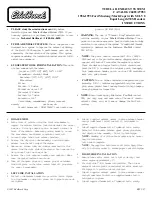
CAUTIONS
■
To avoid activating the SACC super adaptive cruise control by mistake
When.this.function.is.not.in.use,.the.control.handle.should.be.place.in.OFF.position.
■
Situations unsuitable for SACC
Do.not.use.SACC.in.any.of.the.following.situations..Doing.so.may.result.in.loss.of.
control.and.could.cause.an.accident.resulting.in.death.or.serious.injury.
●
In.heavy.traffic.
●
When.in.more.complex.road.conditions.
●
On.roads.with.sharp.bends.
●
On.winding.roads.
●
On.slippery.roads,.such.as.those.covered.with.rain,.ice.or.snow.
●
On.steep.hills.
●
When.there.are.obstacles.other.than.motor.vehicles.in.front.of.the.vehicle.
●
Snow,.rain,.ice,.fog.and.other.weather.
●
When.the.road.lamping.is.insufficient.at.night.
●
The.lane.line.is.unclear.
●
The.road.is.covered.by.vehicles.or.other.obstacles.
■
The driver is the leading operator of the vehicle, who is superior to the SACC
system. When the driver depresses the accelerator and brake pedals or
operate the steering wheel in the advanced cruise state, the driver will control
the vehicle. The driver shall maintain the control to the vehicle and bear full
responsibility.
■
When SACC is operated, the driver should hold the steering wheel with both
hands to ensure the driving safety.
■
SACC is only a driving assist system. If necessary, the driver shall
immediately cancel SACC and drive independently. Observe local laws and
regulations, and adapt to the traffic, road and weather conditions when using
SACC.
■
SACC may malfunction if the front windshield is modified or covered by any
auxiliary equipment.
■
Make sure to turn SACC OFF if leaving the driver seat for an extended period
of time to avoid an accident.
■
When following the target vehicle, SACC mainly controls the headway. The
actual speed may be lower than the set cruise speed.
■
If SACC is activated, when your vehicle is too close to the preceding vehicle
(for example, due to emergency braking of the preceding vehicle), the system
will send a sound and lamp alarm message to you through the combination
instrument. As a result, you should pay attention to the inter-vehicle distance
and control your vehicle.
■
When there are some road signs, watermarks, shadows, asphalt, road cracks,
and etc. on the road surface that may cause improper recognition of the lane
lines and even the vehicle deviation from the current lane, and should be
always paid attention by the driver.
■
When the vehicle is driving on an inclined road or there is a large crosswind
on the outside, SACC system cannot guarantee the cornering ability, and
the driver should pay attention to the conditions and actively intervene the
operation if necessary.
4-5..Using.Other.Driving.Systems
4
Driving
158
159
















































